(© Christophe Coenon)
In Vader, an enigmatic new work from Peeping Tom, a mixed cast of professional dancers and over-sixties poke fun at the supposed afflictions of getting older.
At the heart of the latest dance-theatre production from Peeping Tom (À louer, 32 rue Vandenbranden) is the 76-year-old amateur actor Leo De Beul, who plays the role of an archetypal father. He has been institutionalised in a gloomy, oppressive rest home, where he increasingly seems to “lose” himself in his memories. Or are they dreams, or delusions? “Vader is the first part of a trilogy,” (artistic) director Franck Chartier told us. “It will be followed by Moeder en Kinderen. Despite its not so cheerful setting, I wanted to keep things light-hearted. This father is an extrovert individual, who tackles reality humorously, playfully, and with music.”
Peeping Tom: one foot in the grave
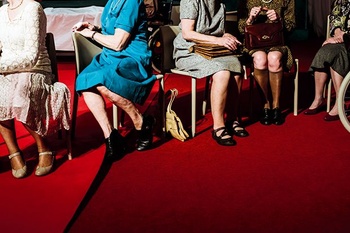
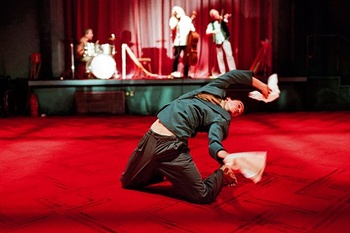
(© Herman Sorgeloos)
Your shows are known for their unusual, cinematic sets. This time, everything happens in a sort of underground old folks’ home.
Franck Chartier: Yes, it’s as if the people staying there already have one foot in the grave – literally. There is only one little window, eight metres up! We found out there really is an old folks’ home like that. Because of a lack of space, they put some elderly people there in the cellars. Only those who no longer have any families, so that nobody will complain about it. That was one of the starting points for this work: what happens if you get stuck there on your own and you are forced to review your life? Another trigger was a theatre workshop we gave in a rest home two years ago, on the theme of “regret”. That stirred up so much, both in ourselves and in the participants, that we wanted to build further on that experience.
Your shows are known for their unusual, cinematic sets. This time, everything happens in a sort of underground old folks’ home.
Franck Chartier: Yes, it’s as if the people staying there already have one foot in the grave – literally. There is only one little window, eight metres up! We found out there really is an old folks’ home like that. Because of a lack of space, they put some elderly people there in the cellars. Only those who no longer have any families, so that nobody will complain about it. That was one of the starting points for this work: what happens if you get stuck there on your own and you are forced to review your life? Another trigger was a theatre workshop we gave in a rest home two years ago, on the theme of “regret”. That stirred up so much, both in ourselves and in the participants, that we wanted to build further on that experience.
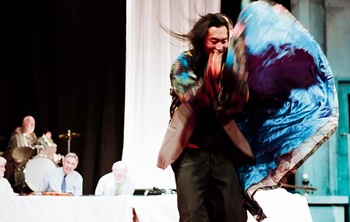
(© Christophe Coenon)
For Vader, you worked with the Senioren-centrum [a centre for elderly people]. There are ten elderly people onstage as extras.
Chartier: Yes, we worked with them three times a week for three months. They play the other residents of Leo’s rest home and are onstage just about all the time. They also had an influence on the creative process. We talked a lot about things like Alzheimer’s, recollections, memory, and so on. But, once again, I wanted to keep it light. In our piece, for example, Leo never has visitors, but the other elderly people pretend to be his visitors. As a spectator, you often don’t know what is genuine and what is made up. Those people entertain themselves – it’s a matter of survival. The offbeat mix of imagination and reality also refers to the gulf that opens up between perception and reality as a result of dementia. I certainly don’t want to idealise it, but that kind of illness doesn’t have to be an entirely negative experience. My own mother, for example, was always very hard on herself and those around her – callous, even – as a younger woman. Since she has been suffering from Alzheimer’s, she is in a certain sense a happier person, much freer emotionally, with more of a sense of humour too. So for this piece we also researched what happens when your brain stops working from time to time: what can then emerge as a sort of parallel universe was, we thought, both exceptionally fascinating and interesting from a theatrical point of view.
For Vader, you worked with the Senioren-centrum [a centre for elderly people]. There are ten elderly people onstage as extras.
Chartier: Yes, we worked with them three times a week for three months. They play the other residents of Leo’s rest home and are onstage just about all the time. They also had an influence on the creative process. We talked a lot about things like Alzheimer’s, recollections, memory, and so on. But, once again, I wanted to keep it light. In our piece, for example, Leo never has visitors, but the other elderly people pretend to be his visitors. As a spectator, you often don’t know what is genuine and what is made up. Those people entertain themselves – it’s a matter of survival. The offbeat mix of imagination and reality also refers to the gulf that opens up between perception and reality as a result of dementia. I certainly don’t want to idealise it, but that kind of illness doesn’t have to be an entirely negative experience. My own mother, for example, was always very hard on herself and those around her – callous, even – as a younger woman. Since she has been suffering from Alzheimer’s, she is in a certain sense a happier person, much freer emotionally, with more of a sense of humour too. So for this piece we also researched what happens when your brain stops working from time to time: what can then emerge as a sort of parallel universe was, we thought, both exceptionally fascinating and interesting from a theatrical point of view.
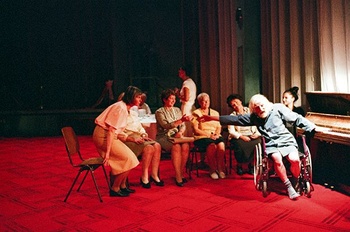
(© Herman Sorgeloos)
Did working with older people influence the piece’s movements and rhythm?
Chartier: Mmm, you don’t have to be a technically trained dancer to recount a lot via body language. The way Leo moves, for example, says a lot about his character. He is very much in the moment itself, and that is really wonderful to watch, in all his fragility. In the rehearsals we always talk about “la pensée du mouvement”, the idea of the way of thinking hidden behind the movements – that’s what we’re interested in. We are less interested in pure abstract dance. There are, of course, also technically amazing passages by the professional dancers; it is important to seek for contrasts within a particular show. But when a non-dancer dances, with the right intention, that can be equally magical and powerful.
Did working with older people influence the piece’s movements and rhythm?
Chartier: Mmm, you don’t have to be a technically trained dancer to recount a lot via body language. The way Leo moves, for example, says a lot about his character. He is very much in the moment itself, and that is really wonderful to watch, in all his fragility. In the rehearsals we always talk about “la pensée du mouvement”, the idea of the way of thinking hidden behind the movements – that’s what we’re interested in. We are less interested in pure abstract dance. There are, of course, also technically amazing passages by the professional dancers; it is important to seek for contrasts within a particular show. But when a non-dancer dances, with the right intention, that can be equally magical and powerful.
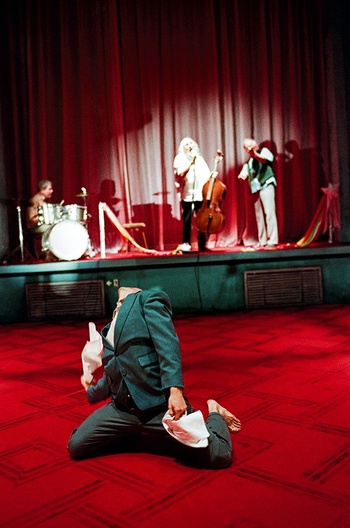
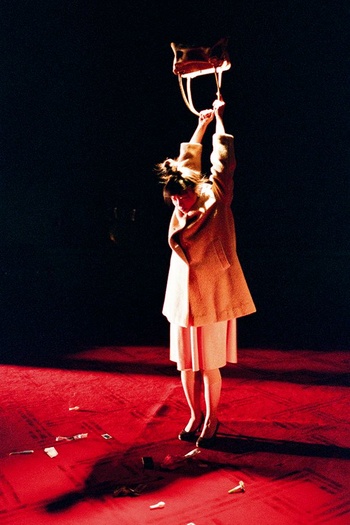
(© Herman Sorgeloos)
Over the years, Peeping Tom has developed a highly distinctive theatrical language, somewhere between dream or nightmare and reality: at once surprising, bizarre, and recognisable. How do you do that?
Chartier: First and foremost, by working for a very long time. For this production, we rehearsed for five months. I could talk about the way of working for a long time, but let me sum it up this way: as directors, we just provide the place where the action will take place; everything takes the scenography as its starting point. After that, it us up to the dancers/actors above all to decide who they are and why they are there. We often give them subjects to feed into their improvisations and then they create scenes together. That way of working involves a number of phases: at first, everything is still fun, full of energy and ideas. But after a good month there is a phase of emptiness, of doubt. It’s only then that it gets really interesting and you arrive – when things go well – at a deeper layer. That, too, is “typical” Peeping Tom, I believe: that quest for the vulnerable and the intimate, the detail, for what is often still taboo in our society or subject to ossified codes of behaviour. In the last month of the working process, we make a selection from all the material the performers have created, so the piece will have coherence and rhythm: about 95% is binned, which can sometimes be very painful for the actors.
Over the years, Peeping Tom has developed a highly distinctive theatrical language, somewhere between dream or nightmare and reality: at once surprising, bizarre, and recognisable. How do you do that?
Chartier: First and foremost, by working for a very long time. For this production, we rehearsed for five months. I could talk about the way of working for a long time, but let me sum it up this way: as directors, we just provide the place where the action will take place; everything takes the scenography as its starting point. After that, it us up to the dancers/actors above all to decide who they are and why they are there. We often give them subjects to feed into their improvisations and then they create scenes together. That way of working involves a number of phases: at first, everything is still fun, full of energy and ideas. But after a good month there is a phase of emptiness, of doubt. It’s only then that it gets really interesting and you arrive – when things go well – at a deeper layer. That, too, is “typical” Peeping Tom, I believe: that quest for the vulnerable and the intimate, the detail, for what is often still taboo in our society or subject to ossified codes of behaviour. In the last month of the working process, we make a selection from all the material the performers have created, so the piece will have coherence and rhythm: about 95% is binned, which can sometimes be very painful for the actors.
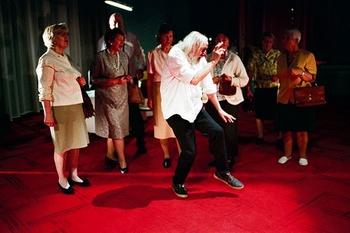
(© Herman Sorgeloos)
Are you trying to tell us something in this piece about how our society today treats old people and old age full stop – that is to say, by hiding them away?
Chartier: I don’t know if you have to see that politically; I think that’s going a bit too far. But of course the fact that I wanted to give old people the opportunity to express themselves was part of it. Did you know that on Japanese television they have an old man or woman speaking almost every quarter of an hour, so that they can give their opinion about something or other? I can’t see that happening here anytime soon…
Have you thought about putting on Vader in old folks’ homes?
Chartier: Oof… [Thinks about it] No, I wouldn’t do that. I think it’s too harsh for that, really, despite the fact that all the actors, both amateurs and professionals, are clearly having a lot of fun onstage. But I’m trying to image, later, when I’m old – which I’m really scared of, by the way – and in a home myself and might watch this piece... No, not really, no.
VADER • 23 > 25 & 29 > 31/10, 20.00, €9 > 20, KVS_BOL, Lakensestraat 146 rue de Laeken, Brussel/Bruxelles, 02-210.11.12, www.kvs.be
Are you trying to tell us something in this piece about how our society today treats old people and old age full stop – that is to say, by hiding them away?
Chartier: I don’t know if you have to see that politically; I think that’s going a bit too far. But of course the fact that I wanted to give old people the opportunity to express themselves was part of it. Did you know that on Japanese television they have an old man or woman speaking almost every quarter of an hour, so that they can give their opinion about something or other? I can’t see that happening here anytime soon…
Have you thought about putting on Vader in old folks’ homes?
Chartier: Oof… [Thinks about it] No, I wouldn’t do that. I think it’s too harsh for that, really, despite the fact that all the actors, both amateurs and professionals, are clearly having a lot of fun onstage. But I’m trying to image, later, when I’m old – which I’m really scared of, by the way – and in a home myself and might watch this piece... No, not really, no.
VADER • 23 > 25 & 29 > 31/10, 20.00, €9 > 20, KVS_BOL, Lakensestraat 146 rue de Laeken, Brussel/Bruxelles, 02-210.11.12, www.kvs.be
Read more about: Podium
Fijn dat je wil reageren. Wie reageert, gaat akkoord met onze huisregels. Hoe reageren via Disqus? Een woordje uitleg.